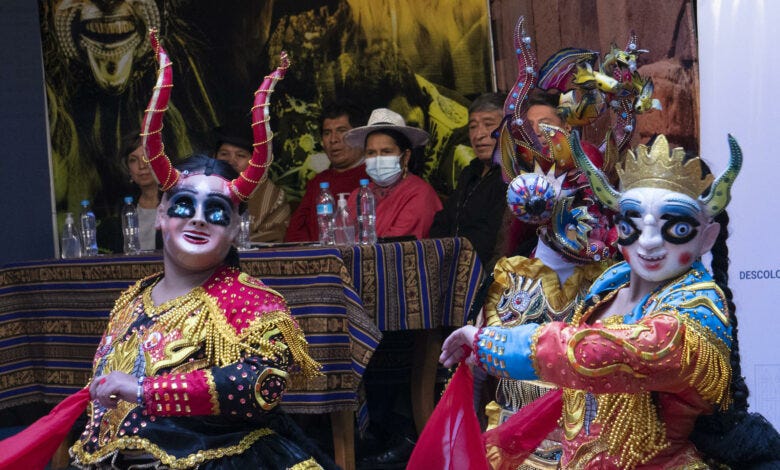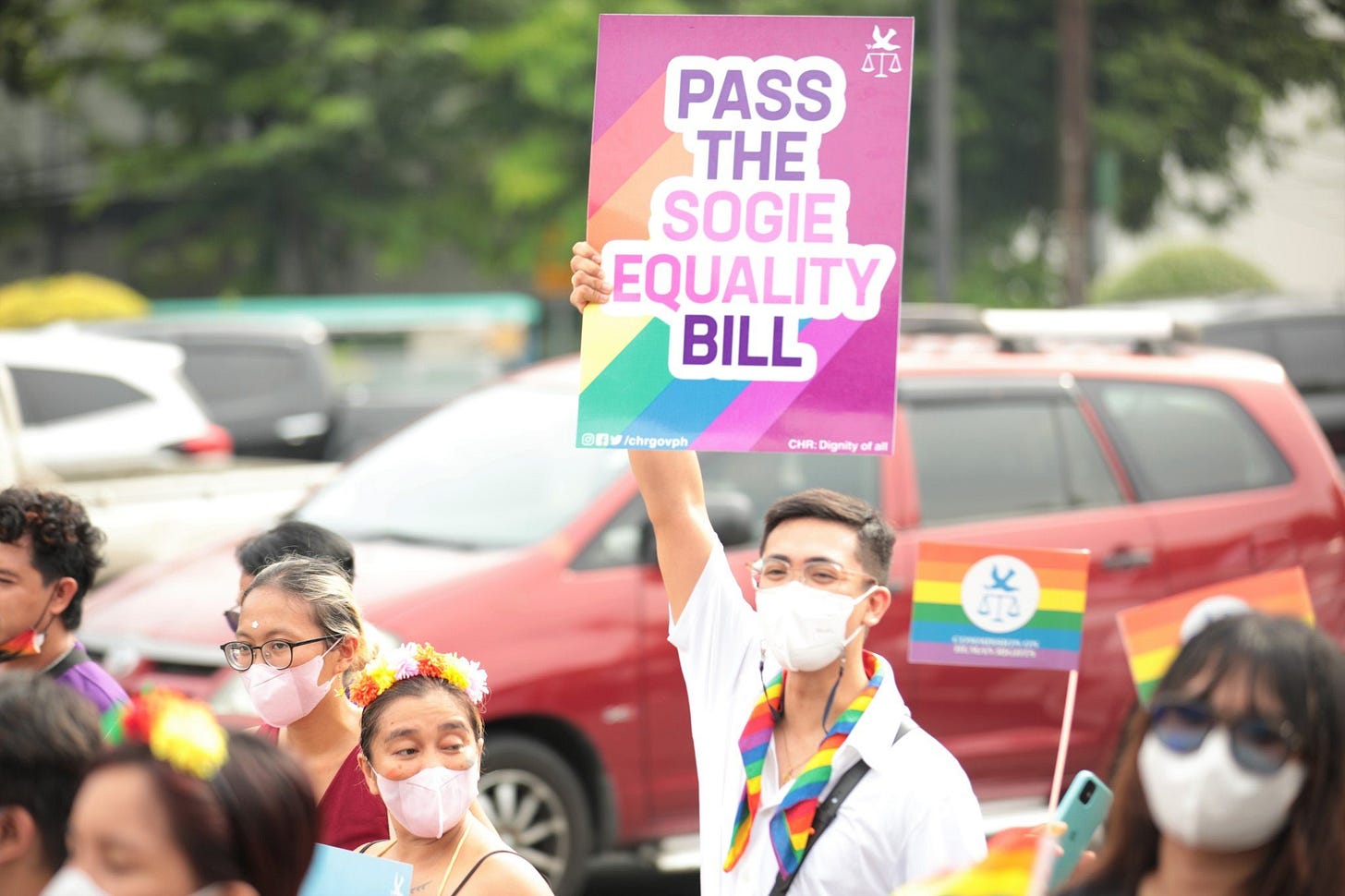Global Roundup: Black Women Documentary, Bolivia Anti-VAW Campaign, Philippines Queer Community, Uganda Women & Divorce, Ace Teen Rom-Com
Curated by FG Contributor Samiha Hossain
Photo via @Ayanaoshun
Canadian filmmaker Ayana O'Shun’s new documentary 'Le Mythe de la Femme Noire' (Myth of the Black Woman), breaks down the harmful stereotypes around Black women and their histories and shows women embracing their own unique identities. The hypersexual Jezebel, the doting mammy, and the angry Black woman are the three tropes that dominate representations of Black women in popular media – and negatively affect Black women in the real world, according to O'Shun.
[Black] women are not a monolithic block. They are diverse, and they are all different. It's possible to break free from them and create your own identity. You don't have to [conform] to these stereotypes. -Ayana O'Shun
The film features interviews with 21 different Black women from various backgrounds, from artists like Quebec rapper Sarahmée to human rights leaders like Myrlande Pierre. O'Shun says she wanted to inspire her audience because as a child, she did not see these types of role models in regular media.
O'Shun cites the experience of one interviewee, psychologist Dr. Myrna Lashley, as an example of how tropes can impact Black women in their day-to-day lives. One day one of the doctor’s colleagues claiming to have marital problems asked her to join him and his wife in bed, reducing her to “a Jezebel, a hypersexual Black woman." O'Shun emphasizes that there is still a lot of work to be done.
The stereotypes have existed for centuries. So it is changing step by step by step by step. I think the change comes through awareness that they exist. -Ayana O'Shun
Photo via La Prensa Latina
In the run up to carnival events next week, a recently-launched Bolivian campaign aims for a violence-free experience for women and children.
The initiative is part of the global “HeForShe” campaign of UN Women, which seeks to engage the efforts of men to eradicate violence and contribute to the construction of more just and egalitarian societies. Training will be given to associations of dancers and musicians who will participate in carnival parades in various Bolivian cities on the theme of violence. Audiovisual and printed material will also be disseminated during these parades and in the media and social networks with awareness-raising messages and information about the entities that deal with cases of violence and the respective contact phone numbers to make complaints.
We want to recover and take advantage of our celebrations, our traditions to face the great challenge that we have in Bolivia to fight and eradicate violence against women. - Mónica Novillo, UN Women Bolivia program management specialist
Minister of Cultures Sabina Orellana highlighted that it is the first time that they will work with folklorists on the prevention of violence and indicated that this will not be limited to carnival, but will be replicated in other festivals throughout the year.
Since Pachamama (Mother Earth) takes care of us all, let us all take care of the life of the Bolivian woman. Whether in the countryside or the city, it doesn’t matter, she is a Bolivian woman. -Sabina Orellana
LGBTQ+ community members and supporters attend the Alab for Love: Pride PH Festival in Quezon City on June 25, 2022. File photo by Michelle Abad/Rappler
In the Philippines, those who are queer cannot always find support from their immediate communities, so they have created their own online communities. “Gay Twitter” is not a closed group but a bunch of queer users who follow and interact with each other, forming an extensive network. It is a safe space where LGBT people and their allies support and defend one another, anonymously or not.
Young and immersed in pop culture, gay Twitter is filled with memes, celebrity gossip, and the occasional “thirst trap.” It is often within these communities that support for human rights and the defense of democracy can be found. Gay Twitter in the Philippines would come to the defense of basic rights that had been under fierce attacks under the previous Duterte administration. When then-president Rodrigo Duterte and his allies moved to shut down media organizations in the Philippines, for example, LGBT-focused accounts were the quickest to protest online. This sector is also behind the biggest online protests on social media, such as the #OustDuterte campaign that happened at the onset of the pandemic.
For members of the LGBT community, we’ve gotten used to living in a society where we’re always isolated and excluded, so we’re almost always trying to find, search or create communities. That’s where social media has become particularly effective: connecting us to people with similar values. -Reyna Valmores, gay rights advocacy group Bahaghari
Advocates like Valmores always emphasize that the Pride movement, as colorful and vibrant as it has become, is still a protest against the systemic discrimination of the LGBT community in the Philippines. Many organizations like Bahaghari, have relied on the supportive and social media-savvy queer community online to push the gay rights movement forward.
At the center of the local gay rights movement is the campaign for a law that punishes discrimination on the basis of one’s sexual orientation, gender identity, or expression. First filed in Congress in the year 2000, the bill is yet to be enacted into law, becoming the longest-running bill to be under Senate interpellation in the Philippines. Now known as the Sexual Orientation, Gender Identity, and Expression, and Sex Characteristics (SOGIESC) Equality bill, the current version filed in both the House of Representatives and the Senate is aiming for equal access of the LGBTQ+ to basic rights and services. It proposes the prohibition of discriminatory acts if made on the basis of SOGIESC, including the denial of access to health and public services, refusing admission or expulsion in schools on the basis of SOGIESC, and revoking the accreditation of organizations based on the SOGIESC of members. It also penalizes other forms of SOGIESC-based harassment, such as forced medical examinations, as well as conversion therapies.
According to Valmores, the biggest challenges are awareness and politicians “who are dedicated and have made it their life’s work to stop any legislation for the LGBT community.” Nonetheless, gay rights groups all over the country have not stopped campaigning for the passage of SOGIESC both on the ground and online.
Photo via Women’s Probono Initiative
Last year, an appeal court in Kampala overturned a high-court divorce case ruling which gave a couple an equal share of the matrimonial home. The court decided that the woman, who did most of the housework, only deserved 20% of the assets. While the man in this case had receipts to show how much he had paid to build and maintain the house, the woman had none.
This ruling sets a bad precedent and rolls back years of hard work to recognise unpaid care work. It values a moneymaker over a homemaker and exposes the law’s failure to address the systemic discrimination of women in Uganda. -Primah Kwagala
Kwagala sees it as problematic that it is left to the judge’s discretion to determine the value of a woman’s non-monetary contribution. She worries that now judges in lower courts could totally disregard women’s non-monetary contribution in future divorce cases. Most women cannot afford to pay legal fees to appeal against such decisions. Since November’s ruling, the Women’s Probono Initiative has received a number of calls from women whose divorce cases they are currently handling, all concerned about the implications.
The scales are already tilted against women, still viewed as property in many communities across Uganda. The constitution views women as equal in dignity and rights, but this is just on paper. -Primah Kwagala
Kwagala believes that a lot remains to be done to protect divorcing women. She calls for updating the Uganda Divorce Act, enacted in 1904 as well as passing the Marriage Bill, which acknowledges care contributions to a home and provides mechanisms for quantifying that in monetary terms when a marriage fails.
Bloomsbury YA via them.us
Haley Neil’s new YA rom-com Planning Perfect centres around a queer Jewish girl, Felicity, on the asexual spectrum. Ahead of Planning Perfect’s release tomorrow, Neil spoke with Them about her YA rom-com’s origins, expanding asexual representation, and exploring teen mental health.
It is deeply important for Neil to talk about asexual spectrum representation. The first time that she read the words “asexual” and “biromantic” in a book was in What If It’s Us by Becky Albertalli and Adam Silvera, which was very impactful for her.
It’s easy to feel like there’s not a place for you and your identity in stories, so seeing that small bit of representation meant the world to me…That was the first one that I saw, and knowing the impact it had on me encouraged me to write my own stories, told me that there was a need for them, and I’ve seen that since I started writing. -Haley Neil
It was also important for Neil to touch on mental health through Felicity’s struggles with anxiety. She says reading more about anxiety would have helped her growing up.
As a writer, it’s such an interesting challenge because you want the reader to experience it with a character. You want them to understand what’s going on, when so often it’s muddled and jumbled in that character’s head. So it’s a challenge to do — and it’s also a responsibility to do it right, especially when I’m thinking about the fact that the audience for this book is a teen reader. -Haley Neil
While writing the book, Neil realized she was writing to the “familiar” beats that she would see in romance stories, in terms of timeline. She then entirely reworked the arc for the relationship in the story. She acknowledges that there is no such thing as normal, but what a relationship will look like for someone on the asexual spectrum will not be exactly the same as a typical outline for a romance story. Overall, Neil had a lot of fun writing Felicity’s voice.
Samiha Hossain (she/her) is a student at the University of Ottawa. She has experience working with survivors of sexual violence in her community, as well as conducting research on gender-based violence. A lot of her time is spent learning about and critically engaging with intersectional feminism, transformative justice and disability justice.
Samiha firmly believes in the power of connecting with people and listening to their stories to create solidarity and heal as a community. She refuses to let anyone thwart her imagination when it comes to envisioning a radically different future full of care webs, nurturance and collective liberation.






